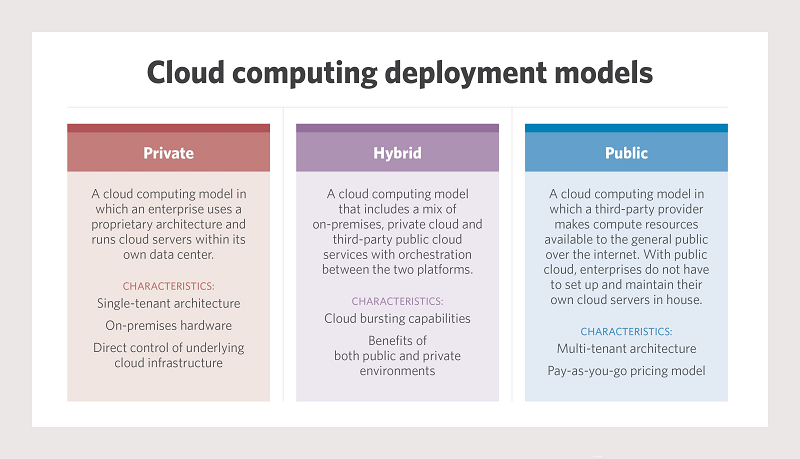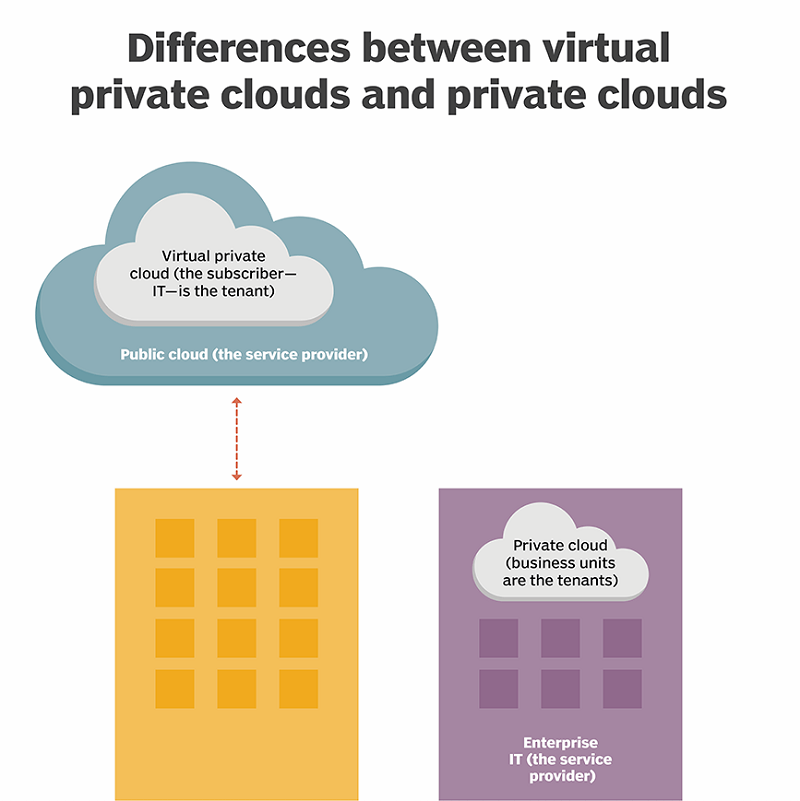Private cloud is a type of cloud computing that delivers similar advantages to public cloud, including scalability and self-service, but through a proprietary architecture. A private cloud, also known as internal or corporate cloud, is dedicated to the needs and goals of a single organization whereas public clouds deliver services to multiple organizations.
How do private clouds work?
A private cloud is a single-tenant environment, meaning the organization using it (the tenant) does not share resources with other users. Those resources can be hosted and managed in a variety of ways. The private cloud might be based on resources and infrastructure already present in an organization's on-premises data center or on new, separate infrastructure, which is provided by a third-party organization. In some cases, the single-tenant environment is enabled solely using virtualization software. In any case, the private cloud and its resources are dedicated to a single user or tenant.
The private cloud is one of three general models for cloud deployment in an organization: public, private and hybrid (there is also multi-cloud, which is any combination of the three). All three models share common basic elements of cloud infrastructure. For example, all clouds need an operating system to function. However, the various types of software -- including virtualization and container software -- stacked on top of the operating system is what determines how the cloud will function, and distinguishes the three main models.

What is the difference between private cloud vs. public cloud?
A public cloud is where an independent, third-party provider, owns and maintains compute resources that customers can access over the internet. Public cloud users share these resources, a model known as a multi-tenant environment.
Private clouds are often deployed when public clouds are deemed inappropriate or inadequate for the needs of a business. For example, a public cloud might not provide the level of service availability or uptime that an organization needs. In other cases, the risk of hosting a mission-critical workload in the public cloud might exceed an organization's risk tolerance, or there might be security or regulatory concerns related to the use of a multi-tenant environment. In these cases, an enterprise might opt to invest in a private cloud to realize the benefits of cloud computing, while maintaining total control and ownership of its environment.
However, public clouds do have advantages. A public cloud offers an opportunity for cost savings through the use of computing as a "utility" -- customers only pay for the resources they use. It can also be a simpler model to implement because the provider handles a portion of the infrastructure responsibilities.
What is the difference between private cloud vs. hybrid cloud?
A hybrid cloud is a model in which a private cloud connects with public cloud infrastructure, allowing an organization to orchestrate workloads across the two environments. In this model, the public cloud effectively becomes an extension of the private cloud to form a single, uniform cloud. A hybrid cloud deployment requires a high level of compatibility between the underlying software and services used by both the public and private clouds.
This model can provide a business with greater flexibility than a private or public cloud because it allows workloads to move between private and public clouds as computing needs and costs change.
A hybrid cloud is suitable for businesses with highly dynamic workloads, as well as businesses that deal in big data processing. In each scenario, the business can split the workloads between the clouds for efficiency, dedicating host sensitive workloads to the private cloud, and more demanding, less specific distributed computing tasks to the public cloud.
In return for its flexibility, the hybrid model sacrifices some of the total control of the private cloud and some of the simplicity and convenience of the public cloud.
Advantages of a private cloud
The main advantage of a private cloud is that users don't share resources. Because of its proprietary nature, a private cloud computing model is best for businesses with dynamic or unpredictable computing needs that require direct control over their environments, typically to meet security, business governance or regulatory compliance requirements.
When an organization properly architects and implements a private cloud, it can provide most of the same benefits found in public clouds, such as user self-service and scalability, as well as the ability to provision and configure virtual machines (VMs) and change or optimize computing resources on demand. An organization can also implement chargeback tools to track computing usage and ensure business units pay only for the resources or services they use.
In addition to those core benefits inherent to both cloud deployment models, private clouds also offer:
- Increased security of an isolated network.
- Increased performance due to resources being solely dedicated to one organization.
- Increased capability for customization.
Disadvantages of a private cloud
Private clouds also have some disadvantages. First, private cloud technologies, such as increased automation and user self-service, can bring some complexity to an enterprise. These technologies typically require an IT team to rearchitect some of its data center infrastructure, as well as adopt additional management tools. As a result, an organization might have to adjust or even increase its IT staff to successfully implement a private cloud. They can also be expensive; often, when a business owns its private cloud, it bears all the acquisition, deployment, support and maintenance costs involved.
Hosted private clouds, while not outright owned by the user, can also be costly. The service provider takes care of basic network maintenance and configuration in a hosted deployment, which means the user needs to subscribe and pay regularly for that offered service. This can end up being more expensive than the upfront cost of complete ownership in the long run, and sacrifices some of the control over maintenance that complete ownership guarantees. Although users will still be operating in a single-tenant environment, providers are likely serving multiple clients, and promising each of them a catered, custom environment. If an incident occurs on the provider's end -- an improperly maintained or overburdened server for example -- users may find themselves facing the same problems the public cloud presents: unreliability and lack of control.
Types of private clouds
Private clouds can differ in the way that they are hosted and managed, providing different functions depending on the needs of the enterprise:
- Virtual -- a virtual private cloud is a walled-off environment within a public cloud that allows an organization to run their workloads in isolation from every other user of the public cloud. Even though the server is shared by other organizations, the virtual logic ensures that a user's computing resources are private. Organizations can use a VPC to enable hybrid cloud deployment.
- Hosted -- in a hosted private cloud environment, the servers are not shared with other organizations. The service provider configures the network, maintains the hardware and updates the software, but the server is occupied by a single organization
- Managed -- this environment is simply a hosted environment in which the provider manages every aspect of the cloud for the organization, including deploying additional services such as identity management and storage. This option is appropriate for organizations that do not have the staff that is equipped to manage private cloud environments alone.

The above list categorizes different types of private clouds by the way they are hosted and to what extent they are managed by the provider. Private cloud infrastructure is also a way to categorize different types. For example:
- Software-only -- provides only the software necessary for running the private cloud environment, which runs on an organization's pre-existing hardware. A software-only option is often utilized in highly virtualized environments.
- Software and hardware -- some vendors sell private clouds as an all-in-one bundle of hardware and software. It is generally a simple platform that exists on the user's premises and may or may not be provider-managed environments.
Managed private cloud pricing
As mentioned, operating a private cloud on premises is generally more expensive upfront than using a public cloud for computing as a utility. This is due to back-end maintenance expenses that come with owning a private infrastructure and the capital expense of implementing one. However, a managed private cloud can mitigate those costs and, in some cases, even be cheaper than a standard public cloud implementation.
Vendors offer a few different models for pricing the managed private cloud. The pricing model and price itself can vary depending on the private cloud hardware and software offered and the level of management provided by the vendor. Often the pricing is based on packages of hardware, software and services that can be utilized in private cloud deployments. For example, VMware prices its virtualization platform vSphere using a yearly subscription and support model, with one yearly price for a basic subscription or a slightly higher price for a production-level subscription, and a flat license fee.
Understanding pricing models for managed private cloud deployments can get complicated. Many vendor websites do not offer a straight-ahead "private cloud" package. Instead, they sell a spectrum of different hardware, software and services that a company can leverage to deploy a private cloud. Often, the pricing for these products is not made explicitly clear on vendor websites, and buyers will be prompted to speak with a salesperson once they've reached the part of the website that focuses on purchase intent. This is likely because private clouds, and managed clouds especially, need to be specifically tailored to a business's needs. Buyers should understand which business processes specifically require the cloud, and why they need flexible and scalable cloud infrastructure, so that they can make an informed choice with the vendor on the proper cloud deployment and the products that comprise it most efficiently.

